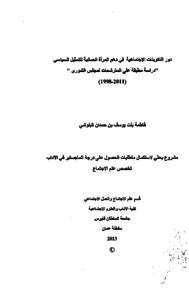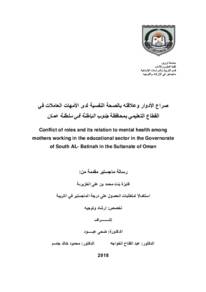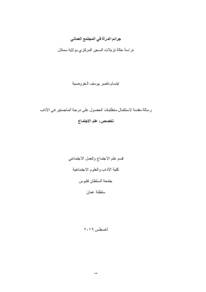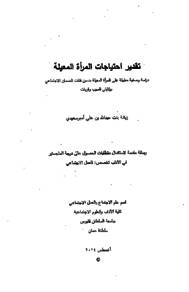Document
دور التكوينات الاجتماعية في دعم المرأة العمانية للتمثيل السياسي "دراسة مطبقة على المترشحات لمجلس الشورى" (1998-2011).
Publisher
جامعة السلطان قابوس
Gregorian
2013
Language
Arabic
Subject
English abstract
The study aims to uncover the role of social institutions in women's political representation support. More specifically, the research intends to investigate the role of family, tribe, community and sablah as either supporting or retarding women in their quest for political representation; i.e. the main objective is to show the effect of these factors in the election process of Majlis Ashura. The research is descriptive, analytical and depends on the social survey of the whole population together with quantitative and quantitative data analyzing methods. Focus group discussion is also used to gain deep information.
The research came up with very important results the most important of which are: the high level of the relative strength index of the social institutions in supporting women political representation. The nature of their relative support is arranged from high to low strength as follows: candidate's family, tribe, community and finally, society's acceptance of the candidates.
The results also show that there are significant statistical variations between the variables of monthly income, job, residential area, period of candidacy, and number of candidacy and between social institutions. Moreover, it showed that there is no statistically significant correlation between age, educational level, marital status, place of residency and number of successes. The results were used for making practical suggestions for better electoral performance of Omani women in the future.
Member of
Resource URL
Arabic abstract
هدف البحث إلى الكشف عن دور التكوينات الاجتماعية في دعم المرأة العمانية للتمثيل السياسي، وتوضيح دور كلا من (الأسرة، القبيلة، المجتمع المحلي، السبلة) كداعم أو معوق في وصول المرأة للتمثيل السياسي، في محاولة للتوصل إلى مجموعة من المقترحات والبرامج لرفع مستوى الوعي بأهمية مؤسسات المجتمع المشار إليها في تسهيل وصول المرأة العمانية إلى التمثيل السياسي عبر الانتخاب كما في حالة مجلس الشورى.
وقد اعتمدت الباحثة على الأسلوب الوصفي التحليلي، مستخدمة طريقة المسح الاجتماعي الشامل، ومنهجية التحليل الكمي والكيفي للبيانات، بإستخدام الأساليب الاحصائية التحليلية؛ وللتعمق في أبعاد البحث استخدمت الباحثة المقابلات الجماعية البؤرية Focus Group) Discussion للحصول على معلومات أكثر عمقا، للمساعدة في تفسير نتائج البحث.
وقد توصلت الباحثة إلى مجموعة من النتائج أهمها: ارتفاع القوة النسبية الأبعاد التكوينات الاجتماعية في دعم المرأة العمانية التمثيل السياسي، واتضح أن ترتیب هذه الأبعاد على النحو الآتي: جاء دور أسرة المترشحة وأثرها في دعمها للتمثيل السياسي في المرتبة الأولى، يليها دور قبيلة المترشحة ، ثم دعم المجتمع المحلي للمترشحة، وأخيرا نظرة المجتمع وتقبله للمترشحة. كما توصل البحث إلى وجود فروق دالة احصائيا بين كل من متغيرات الدخل الشهري، العمل، المنطقة السكنية، وكذلك فترة الترشح، وعدد مرات الترشح وبين دور التكوينات الاجتماعية، في حين أفصح البحث عن عدم وجود علاقة دالة احصائيا بين كلا من : العمر، المستوى التعليمي، الحالة الزواجية، مكان الإقامة، وكذلك عدد مرات النجاح، وتم توظيف نتائج البحث في مقترحات لأداء انتخابي أفضل للمرأة العمانية.
وقد اعتمدت الباحثة على الأسلوب الوصفي التحليلي، مستخدمة طريقة المسح الاجتماعي الشامل، ومنهجية التحليل الكمي والكيفي للبيانات، بإستخدام الأساليب الاحصائية التحليلية؛ وللتعمق في أبعاد البحث استخدمت الباحثة المقابلات الجماعية البؤرية Focus Group) Discussion للحصول على معلومات أكثر عمقا، للمساعدة في تفسير نتائج البحث.
وقد توصلت الباحثة إلى مجموعة من النتائج أهمها: ارتفاع القوة النسبية الأبعاد التكوينات الاجتماعية في دعم المرأة العمانية التمثيل السياسي، واتضح أن ترتیب هذه الأبعاد على النحو الآتي: جاء دور أسرة المترشحة وأثرها في دعمها للتمثيل السياسي في المرتبة الأولى، يليها دور قبيلة المترشحة ، ثم دعم المجتمع المحلي للمترشحة، وأخيرا نظرة المجتمع وتقبله للمترشحة. كما توصل البحث إلى وجود فروق دالة احصائيا بين كل من متغيرات الدخل الشهري، العمل، المنطقة السكنية، وكذلك فترة الترشح، وعدد مرات الترشح وبين دور التكوينات الاجتماعية، في حين أفصح البحث عن عدم وجود علاقة دالة احصائيا بين كلا من : العمر، المستوى التعليمي، الحالة الزواجية، مكان الإقامة، وكذلك عدد مرات النجاح، وتم توظيف نتائج البحث في مقترحات لأداء انتخابي أفضل للمرأة العمانية.
Category
Theses and Dissertations







